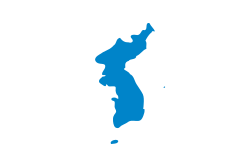
Back قومية كورية Arabic ناسیۆنالیزمی کۆری CKB Nacionalismo coreano Spanish Nationalisme coréen French Nacionalismo coreano Galician Nasionalisme Korea ID 韓国の民族主義 Japanese 한국 국민주의 Korean Nacionalismo coreano Portuguese Корейський націоналізм Ukrainian
This article has multiple issues. Please help improve it or discuss these issues on the talk page. (Learn how and when to remove these messages)
|
| Part of a series on |
| Korean nationalism |
|---|
 |
Korean nationalism[a] can be viewed in two different contexts. One encompasses various movements throughout history to maintain a Korean cultural identity, history, and ethnicity (or "race"). This ethnic nationalism was mainly forged in opposition to foreign incursion and rule. The second context encompasses how Korean nationalism changed after the partition in 1945.[how?] Today, the former tends to predominate.[5]
- ^ 인종·언어·영토, 민족 구성 요건 아니다: 에르네스트 르낭 《민족이란 무엇인가》 [Race, language, and territory are not the constituent requirements of the nation: Ernest Renan "What Is a Nation?"]. The Korea Economic Daily (in Korean). Retrieved 15 August 2024.
르낭은 "공동체 삶을 지속하려는 욕구, 각자가 받은 유산을 발전시키고자 하는 의지가 중요하고, 이런 것이 존중될 때 '열린 민족주의'가 된다"고 강조했다.
- ^ '시민민족주의'가 답이다 ['Civic nationalism' is the answer.]. JoongAng Ilbo (in Korean). Retrieved 15 August 2024.
- ^ 민족주의 (民族主義) [Nationalism]. National Institute of Korean Language's: Korean-English Learners' Dictionary (in Korean). Retrieved 15 August 2024.
'nation'과 'nationalism'의 번역어는 국민과 국민주의, 국가와 국가주의, 민족과 민족주의 등 다양할 수 있는데 이 중에서 민족과 민족주의가 지배적 번역어로 채택된 사정은 한국의 식민화 과정과 밀접하게 관련되는 것이었다.
[The translations of 'nation' or 'nationalism' can be diverse, including 국가 or 국가주의, 국민 or 국민주의, and 민족 or 민족주의, the situation in which 민족 or 민족주의 were adopted as the dominant translation language was closely related to the colonization process of Korea.] - ^ 민족주의 (民族主義). National Institute of Korean Language's: Korean-English Learners' Dictionary (in Korean). Retrieved 15 August 2024.
nationalism
- ^ Kim, Hee-sun (2007). "Musical Representation of Nationalism in Contemporary South Korea" 민족주의의 음악적 표상: 한국 전통 음악 담론과 연행에서 민족주의 [Musical Representation of Nationalism in Contemporary South Korea]. 동양음악(Journal of the Asian Music Research Institute) 동양음악 [Journal of the Asian Music Research Institute]. 29: 165–194. hdl:10371/87889. ISSN 1975-0218.
Cite error: There are <ref group=lower-alpha> tags or {{efn}} templates on this page, but the references will not show without a {{reflist|group=lower-alpha}} template or {{notelist}} template (see the help page).
© MMXXIII Rich X Search. We shall prevail. All rights reserved. Rich X Search